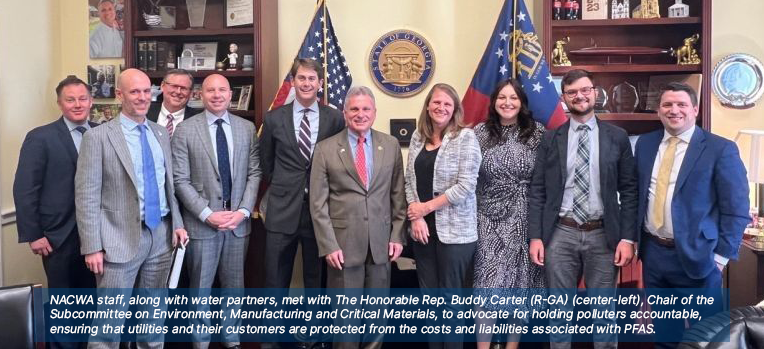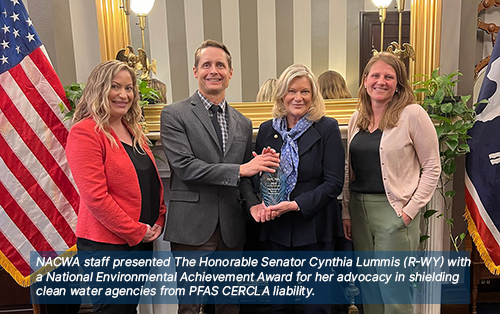Widgets 2021
Bootstrap Spacing
For a list of classes to utilize for grid spacing, please reference this article: https://www.w3schools.com/bootstrap4/bootstrap_utilities.asp
Please, reference the "Spacing" section, and "More Spacing Examples" for visuals.
News
News List Simple
-
December 18, 2025
NACWA Urges Court to Reject Proposed PFAS Settlements in Federal Filing
-
December 18, 2025
NACWA, AMWA Urge HHS to Support Permanent Low-Income Water Assistance Program
-
December 18, 2025
Active State PFAS Proposals Signal Policy Directions to Watch in Upcoming Legislative Sessions
-
December 18, 2025
NACWA Meets with EPA’s Office of Wastewater Management on 2026 Priorities
News List Summary
-
NACWA Urges Court to Reject Proposed PFAS Settlements in Federal Filing
December 18, 2025 -
NACWA, AMWA Urge HHS to Support Permanent Low-Income Water Assistance Program
December 18, 2025
News List Read More
News Block List
Events
Event List Simple
-
Jan 01 2016
Archived Events (2002-2016)
-
Feb 21 2016
2016 Winter Conference
-
May 17 2016
2016 National Pretreatment and Pollution Prevention Workshop & Training
-
Jul 10 2016
Utility Leadership Conference & 46th Annual Meeting
Event List Summary
-
Jan 01 2016
Archived Events (2002-2016)
Register -
Feb 21 2016
2016 Winter Conference
Lorem ipsum dolor sit amet, consectetur adipiscing elit, sed do eiusmod tempor incididunt ut labore et dolore magna aliqua. Ut enim ad minim veniam, quis nostrud exercitation ullamco laboris nisi ut aliquip ex ea commodo consequat.Learn More -
May 17 2016
2016 National Pretreatment and Pollution Prevention Workshop & Training
Lorem ipsum dolor sit amet, consectetur adipiscing elit, sed do eiusmod tempor incididunt ut labore et dolore magna aliqua.Learn More
Event List Date Left
2016 Winter Conference
Event List iCal
2016 Winter Conference
2016 National Pretreatment and Pollution Prevention Workshop & Training
Blogs
Blog Post List Simple
Shaping the Narrative: Advocating for Rational PFAS Solutions
The technical, operational, and financial challenges that confront clean water agencies due to PFAS are among the greatest threats the sector has seen. As federal and state regulators race to control PFAS pollution – after decades of industrial use – clean water agencies are caught in the crosshairs. Some in the environmental activist community, media and the general public are pointing to clean water agencies as polluters, trying to build the case that utilities are part of the problem, rather than part of the solution.
NACWA is working across all available advocacy avenues to refute this message and push for logical solutions. Protecting public health and the environment requires greater focus on source control, regulations that reflect risk and are rooted in sound science, ensuring burdens accrue to polluters, not the public, and ensuring that clean water agencies can continue to sustainably provide vital services in their communities.

NACWA’s advocacy on PFAS issues generally, and on protecting biosolids land application specifically, continues to highlight the collective value of NACWA’s integrated regulatory, legislative, legal, and communications advocacy expertise. Our efforts this year have included:
- Targeted advocacy and dialogue with U.S. EPA about the threat to land application and the need to proactively protect land application of biosolids.
- Participation in a three-part facilitated workshop initiated by U.S. EPA at NACWA’s urging to bring together federal and state regulators with the regulated clean water agency and solid waste communities to focus on the growing biosolids management challenges brought on by PFAS. The workshop underscored for senior EPA decision makers the impacts states and utilities will face if any of the biosolids management pathways are eliminated.
- Persistent engagement with U.S. EPA regarding the impact of the Comprehensive Environmental Response, Compensation, and Liability Act (CERCLA) on the public clean water community. This led to recognition in an Enforcement Discretion and Settlement Policy that EPA does not intend to pursue entities including publicly owned treatment works, municipal stormwater systems, and farms where biosolids are applied.
- Working with U.S. EPA in support of developing an appropriate national biosolids standard for PFAS through engagement in its Biosolids Risk Assessment process.

- Successfully urging the Agency to drop its biosolids sampling proposal as part of its unrelated Influent Study. The biosolids portion will now be appropriately postponed until the Agency’s Biosolids Risk Assessment is complete.
- Continuing to organize the Water Coalition Against PFAS, which is focused on securing an exemption for the water sector from CERCLA liability for PFAS. Bipartisan legislation protecting water systems has been introduced in the U.S House of Representatives to complement continued Senate-led negotiations.
- Engaging on several state level proposals to restrict biosolids land application that could potentially set concerning precedent.
- Releasing a report highlighting the cost impacts of PFAS to members.
- Developing numerous resources, including:
- PFAS CERCLA Primer for Clean Water Utilities
- Utility PFAS CERCLA Checklist
- Reportable Quantities Calculator for Use in Evaluating CERCLA Responsibilities
- Communications Toolkit for PFAS and Biosolids
- PFAS Considerations Document
NACWA’s work on these fronts is ongoing and we are readying additional resources in anticipation of key developments this fall, including the conclusion of U.S. EPA’s Biosolids Risk Assessment for PFOA and PFOS and the imminent release of human health water quality criteria for certain PFAS. We are well-poised with strong working relationships and recognized expertise among U.S. EPA and Congressional staff, to continue navigating these highly charged issues and to serve as a resource for clean water agencies nationwide.
For more information visit the PFAS Resources webpage.
Blog Post List Summary
Shaping the Narrative: Advocating for Rational PFAS Solutions
The technical, operational, and financial challenges that confront clean water agencies due to PFAS are among the greatest threats the sector has seen. As federal and state regulators race to control PFAS pollution – after decades of industrial use – clean water agencies are caught in the crosshairs. Some in the environmental activist community, media and the general public are pointing to clean water agencies as polluters, trying to build the case that utilities are part of the problem, rather than part of the solution.
NACWA is working across all available advocacy avenues to refute this message and push for logical solutions. Protecting public health and the environment requires greater focus on source control, regulations that reflect risk and are rooted in sound science, ensuring burdens accrue to polluters, not the public, and ensuring that clean water agencies can continue to sustainably provide vital services in their communities.

NACWA’s advocacy on PFAS issues generally, and on protecting biosolids land application specifically, continues to highlight the collective value of NACWA’s integrated regulatory, legislative, legal, and communications advocacy expertise. Our efforts this year have included:
- Targeted advocacy and dialogue with U.S. EPA about the threat to land application and the need to proactively protect land application of biosolids.
- Participation in a three-part facilitated workshop initiated by U.S. EPA at NACWA’s urging to bring together federal and state regulators with the regulated clean water agency and solid waste communities to focus on the growing biosolids management challenges brought on by PFAS. The workshop underscored for senior EPA decision makers the impacts states and utilities will face if any of the biosolids management pathways are eliminated.
- Persistent engagement with U.S. EPA regarding the impact of the Comprehensive Environmental Response, Compensation, and Liability Act (CERCLA) on the public clean water community. This led to recognition in an Enforcement Discretion and Settlement Policy that EPA does not intend to pursue entities including publicly owned treatment works, municipal stormwater systems, and farms where biosolids are applied.
- Working with U.S. EPA in support of developing an appropriate national biosolids standard for PFAS through engagement in its Biosolids Risk Assessment process.

- Successfully urging the Agency to drop its biosolids sampling proposal as part of its unrelated Influent Study. The biosolids portion will now be appropriately postponed until the Agency’s Biosolids Risk Assessment is complete.
- Continuing to organize the Water Coalition Against PFAS, which is focused on securing an exemption for the water sector from CERCLA liability for PFAS. Bipartisan legislation protecting water systems has been introduced in the U.S House of Representatives to complement continued Senate-led negotiations.
- Engaging on several state level proposals to restrict biosolids land application that could potentially set concerning precedent.
- Releasing a report highlighting the cost impacts of PFAS to members.
- Developing numerous resources, including:
- PFAS CERCLA Primer for Clean Water Utilities
- Utility PFAS CERCLA Checklist
- Reportable Quantities Calculator for Use in Evaluating CERCLA Responsibilities
- Communications Toolkit for PFAS and Biosolids
- PFAS Considerations Document
NACWA’s work on these fronts is ongoing and we are readying additional resources in anticipation of key developments this fall, including the conclusion of U.S. EPA’s Biosolids Risk Assessment for PFOA and PFOS and the imminent release of human health water quality criteria for certain PFAS. We are well-poised with strong working relationships and recognized expertise among U.S. EPA and Congressional staff, to continue navigating these highly charged issues and to serve as a resource for clean water agencies nationwide.
For more information visit the PFAS Resources webpage.
Lists
Simple List
EIM Gold Awards
-
2020 Awards
-
2021 Awards
-
2022 Awards
-
2023 Awards
-
2019 Awards
-
2018 Awards
-
2017 Awards
-
2015 Awards
-
2014 Awards
-
2013 Awards
-
2012 Awards